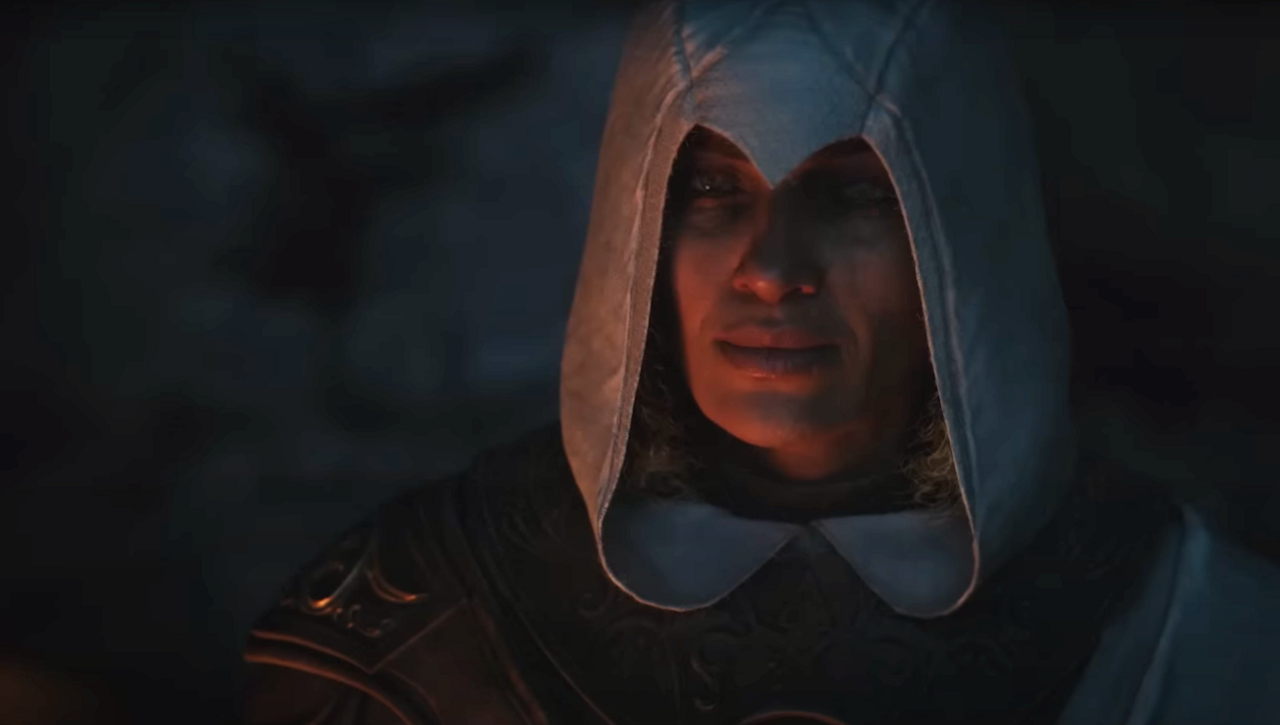Back in 2020 when I reviewed Assassin’s Creed Valhalla, I talked about how much that game’s story had a real sense of finality to it, bringing together and concluding dozens of narrative threads from across the franchise. Although it serves as somewhat of a prequel for Valhalla, Assassin’s Creed Mirage doesn’t push the series’ story in new directions, opting instead for a narrative that is heavily dependent on you already knowing Basim’s story in Valhalla. Mirage does get back to the basics that first defined the series by refocusing on social stealth and making it fun to learn about a city’s history, but a weak cast of characters keeps it from reaching the same heights as some of its earliest predecessors.
Ubisoft Bordeaux’s vision of ninth-century Baghdad stands out as the most compelling part of Mirage. While I can’t speak to its authenticity, Baghdad’s colorful, multi-layered architecture creates a playground of possibilities, offering numerous avenues for navigating the city, sneaking past guards, and reaching your objective. Freerunning is intuitive, though occasionally clumsy in its design, with Basim sometimes getting snagged on corners or leaping off rooftops in a way I didn’t intend. These mishaps are thankfully not very common, allowing you to focus on strategizing how you want to get from one building to the next.
But most of all, Baghdad feels alive in its history, incorporating pinnacles of the city–like the House of Wisdom–into main story missions and highlighting every discovery and fresh face with new pages in an expansive codex that details the history, culture, and importance of the setting. In the earliest days of the franchise, Assassin’s Creed helped me pass my History classes by making European history fun to learn about, and Mirage does the same here for Baghdad, highlighting the golden age of a city and culture not often touched on in world history and certainly not in modern media.
It’s all presented with the usual odd and outdated assortment of quirks of past Assassin’s Creed games, with characters slipping in and out of their native tongue mid-sentence and using expressions that haven’t been coined yet, but uncovering the many intricacies of Baghdad has been fascinating for someone like me who doesn’t have a firm grasp of Islamic culture and history. Baghdad is fun to explore both from a gameplay perspective–with an assortment of pulleys, platforms, balconies, and rooftops transforming the whole city into a parkour playground–and a historical one, bringing life and culture to Mirage in a way none of the actual main characters manage to do.
You’ll be exploring that city as Basim Ibn Ishaq, a talented street thief who eventually joins the Hidden Ones, the precursors to the Assassin Brotherhood. Basim is assigned to eliminate the various members of the Order of Ancients, the precursors to the Templar Order, who control Baghdad from the shadows. Leaning into his origins as a thief, Basim excels at subterfuge and stealth. You can openly fight enemies in Mirage, and Basim is a fierce duelist who can parry and execute individual enemies with satisfying ease. However, once you’re confronted by three or more guards, Basim’s skillset is far better suited to running away and hiding. This encourages you to embrace the social-stealth elements in the game–hiding in plain sight within crowds, scouting areas from the rooftops, and utilizing an assortment of gadgets to mask your presence or distract enemies.
The gadgets at his disposal range from throwing knives and sleep darts to noisemakers and traps, and they can be customized with materials discovered in hidden chests or earned by completing optional contracts, allowing you to further define your ideal approach to stealth. The throwing knives, for example, can be strengthened to cut through thick armor, enabling you to stealthily take down even the strongest of enemies, or you can instead coat them with a corrosive material meaning they’ll dissolve the bodies of weaker enemies and leave behind no trace for others to find. You unlock new tools, new options for your tools, and new abilities for Basim at a fairly regular rate, and Mirage allows you to easily tweak your build.
Like previous Assassin’s Creed games, the enemy AI in Mirage is dumb as rocks and they’ll fall for the same tricks over and over. This is particularly noticeable in Mirage, as this game places more of an emphasis on stealth and makes Basim much less of a powerhouse, but the enemies don’t present any sort of opposition in most cases. Challenge is instead dictated by enemy placement, Basim’s resources, and the design of buildings. Utilizing Basim’s eagle companion and all-seeing supernatural Eagle Vision ability, you can scout an area to get the lay of the land, map enemy positions, and then plan how you’re going to use your assortment of stocked tools and freerunning abilities to navigate the space without drawing attention. Breaking stealth is never punished with an immediate game over–keeping each mission from becoming overly frustrating–but failing certain conditions, like preventing multiple guards from seeing you or not stopping a lookout from sounding an alarm, can lead to a game over. With an area on high alert, Basim can be swarmed by enemies, which in turn can up the challenge considerably, and since you’re not a Greek demi-god or Viking berserker like in the last two Assassin’s Creed games, it’s better not to be outnumbered. Because of this, there’s still a gratifying tension to maintaining your stealth.
There are more than immediate consequences to being discovered as well. As citizens watch Basim in action, they’ll report him to the city’s guards for his transgressions. A more lethal playstyle allows Basim to handle threats quickly and effectively but at the cost of citizens reacting with much more vitriol toward him if they see him do the deed. While putting guards to sleep, blinding them with smoke, or taking the time to safely circumnavigate them will keep you off the city’s radar, it can come at the cost of losing sight of your target or missing your chance to take advantage of a distraction, so it’s a balancing act of risk versus reward.
As Basim’s notoriety climbs, the city becomes more dangerous to him. Citizens will recognize him when he tries to blend into groups and call for the guards, archers will patrol the rooftops, and specialized bounty hunters will pursue him across the city. It pays to remain hidden and unnoticed when planning an assassination mission, lest you make getting around the city much more laborious and dangerous once the mission is complete. And if the heat gets to be too much for you, taking a break to rip down wanted posters and bribe city heralds can lower your notoriety.

I found notoriety to be too lenient of a system, however. The entire basis of its threat is that enemies more easily recognize Basim and pursue him with more aggression but, again, the enemy AI isn’t very smart. Rarely do they react in a timely enough manner for a citizen’s warnings to lead to a chase, and even when they do, Basim is far more nimble on the rooftops than his pursuers. The random nature of chases lacks the curated placement of guards in stealth encounters as well, completely negating any sort of challenge and making the increased notoriety more of a mild annoyance than anything else. Instead of feeling like the city is becoming more aware of you and testing you to utilize every trick you have in a desperate gamble to reduce your notoriety, it feels like the game is trying to force a mild frustration onto you that you have to take care of before you can go back to enjoying it.
Thankfully, these forced breaks from tackling your next assignment are the only ones you have to make–no one will be pulling you out of the simulation this time around. Like past games in the franchise, the entire experience of Mirage is a virtual-reality simulation being watched by someone in the present day. However, there is hardly any modern-day storyline in Mirage; something we haven’t seen since 2012’s Assassin’s Creed: Liberation. Much like Liberation, there’s a short intro at the start of Mirage that lets you know you’re actually playing as someone in the present day who is using an advanced virtual-reality program to relive Basim’s life. And like Liberation, it’s never brought up again. You aren’t woken up at key moments partway through the story to see what’s happening in the present day. This is solely Basim’s story.
Mirage is one of the most concise Assassin’s Creed storylines we’ve had in a decade as a result. Every part of the storyline is written in service of Basim’s journey without needing to twist it in some way to answer a question posed by a secondary present-day protagonist. Without another face distracting the narrative, we’re allowed to focus on Basim and see how his desperate struggle to make the world a better place for the likes of the downtrodden becomes twisted and jaded over time. There’s a genuine earnestness to him that slowly erodes as he’s faced with the complexities of balancing a desire to serve the greater good and an ever-present need to serve himself.
The issue that Mirage runs into is that this characterization doesn’t stand on its own. Basim doesn’t have much of a narrative arc throughout Mirage; instead, his journey leans on the knowledge that he is destined for a tragic fall that will twist him into becoming one of the main antagonists to Eivor in Valhalla. Basim’s storyline is filled with hints and misdirects, toying with you as it pulls you along, leaving you guessing as to what’s finally going to be the catalyst for his eventual downfall only to then conclude when he finally reaches some semblance of development. There’s a whole lot of context missing if you haven’t played Valhalla, and Basim’s story is only interesting if you have that context. Without it, you’re left wondering what the journey was all for.
The game’s story doesn’t completely fall apart without knowing Basim’s future, however. Basim’s story is told within the confines of his hunt for the Order of Ancients, the stakes of which are laid plain in Mirage’s opening act. The Order wants to control society. The Hidden Ones think that’s bad and want to stop them to preserve people’s personal freedoms. Basim is a Hidden One so his stance on the matter is pretty cut-and-dry. There’s no personal investment helping you to buy into Basim’s motivations for hunting the Order down but the game at least sets up that he may at least feel duty-bound to the task at hand. It’s not enough to make things interesting but the loose framework works out and it at least brings you into Mirage’s most enjoyable gameplay loop: the investigations.
Basim’s hunt for the Order is organized into individual cases, tasking you with uncovering clues that eventually reveal the location of the lower-ranking members of the Order of Ancients. As you kill these targets, their deaths slowly reveal the true identity of the handful of big bads that they serve, unlocking the mission to go hunt them down.
The hunt for the Order of Ancients is at the center of Mirage’s gameplay loop, injecting the freeform nature of how these hunts worked in Odyssey and Valhalla within the step-by-step framework of the original Assassin’s Creed. Though the beginning and end of Mirage are entirely linear, the middle portion is completely open, allowing you to tackle three separate investigations in whatever order you want. The freedom to chase leads at your leisure encourages you to go after whatever interests you, with every lead reliably leading to the satisfaction of crossing another name off your list.
Many of the smaller cases crisscross with one another as well, unifying the open-ended nature of Mirage into a more concise narrative. At the end of the day, you’re trying to unearth the face behind the mask at the top of this branch of the Order, but the very nature of your investigations clues you into how the entire group has insidiously wormed their way into the inner echelons of Baghdad. You are a predator and the Order is your prey, but as you fill out your evidence board with clues, you quickly discern how those roles could be reversed. The Order is everywhere and their influence touches almost every aspect of Baghdad. It’s not hard to believe that one of your allies may secretly be one of them, and I remained glued to every conversation Basim had with his friends if only to discern hints of a future betrayal that may or may not come.

The benefit of such an intriguing twist is lessened by Mirage’s weak cast, however. Beyond Basim’s closest allies–his childhood friend and fellow street thief, Nehal, and his mentor and surrogate mother, Roshan–the rest of the characters are paper-thin and forgettable stand-ins who are really just there to deliver exposition. Most of the conversations Basim has with other characters left me wanting for more, or at least wishing for more time with Nehal or Roshan instead. Both women act as foils to one another and provide further insight into Basim. Whereas Nehal wants Basim to pursue his own personal agency and seek care for the nightmarish visions that have plagued him his entire life, Roshan admonishes Basim for seeking these answers and demands he instead pours his pain and trauma into being a better killer.
It’s an interesting dichotomy that’s not given the space to be explored in any sort of entertaining way. Both women, despite touching on potentially interesting themes of identity and coming to terms with one’s past, are practically nonexistent within the story, only popping up briefly to pose an idea before leaving just as quickly. Worse, their characterization almost seems to leapfrog from scene to scene, with both shifting in how they feel about Basim with an unrealistic swiftness that doesn’t feel authentic to how human emotions work. Nehal, in particular, gave me whiplash for how quickly she forgave Basim for an earlier transgression, only to then reappear hours later somehow still angry with him.
By the time the credits rolled, I was annoyed that Nehal and Roshan share so few back-to-back scenes to really hammer home how the two sides of Basim–one of which seeks the truth while the other blindly fulfills duty–are struggling for dominance of his consciousness. This internal strife is at the center of Basim’s tragedy and could have brought those aspects of Basim’s story from Valhalla into Mirage. Instead, the build-up of these opposing ideas falls flat at the climax, highlighting how so much of the dialogue in Mirage is tedious conversations with boring supporting characters.

Regardless, your efforts in unraveling the mysteries of the Order culminate in rewarding assassination missions. These resemble the Black Box missions seen in Assassin’s Creed Unity and Syndicate, with Basim tasked with infiltrating an area, uncovering the identity and location of his target, learning of possible ways to assassinate them, and then executing a plan. These five assignments are the best part of the game, leaning into a mission structure that prioritizes creative reactivity. Each of these assignments is located in a different area, creating its own variety of challenges. An assassination in an auction tasks you with securing a specific item to gain an audience with your target, but it’s up to you to decide if you’re going to just buy the item outright or steal it from one of the other prospective buyers. Meanwhile, an assassination within an underground dungeon requires you to figure out how to even get down there in the first place and whether it’s better to kill the guards inside or risk hiding among the prisoners.
Basim can unlock new pathways forward in these Black Box missions by bribing servants for information, stealing keys from guards, eavesdropping on conversations, or finding and donning disguises. You can also just murder everything that stands between you and the target if you so wish, though that’s a difficult prospect given the number of guards devoted to these locations. During these Black Box missions, Mirage provides guidance on what you should do next–find a way downstairs, for instance, or draw your target out of hiding–but these are general guidelines with room for improvisation in how you go about completing them, and it’s so fulfilling to see your well-laid plans come together and rewarded with crossing another name off your list.

